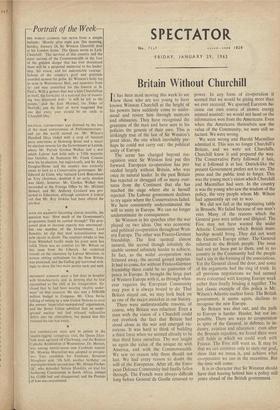Britain Without Churchill
IT has been most moving this week to see how those who are too young to have known Winston Churchill at the height of his powers have suddenly come to under- stand and revere him through memoirs and obituaries. They have recognised the greatness of the man and have seen in his policies the genesis of their own. This is strikingly true of the last of Sir Winston's great ideas, the one which inevitably per- haps he could not carry out : the political unity of Europe.
The scene has changed beyond rec- ognition since Sir Winston first put this forward. European co-operation has pro- ceeded largely without Britain, who was once its natural leader. In the past Britain has rejected or shrugged off so many over- tures from the Continent that she has reached the stage where she is herself rejected. The Labour government declines to try again where the Conservatives failed. We have consistently underestimated the will to unity in Europe. We can no longer underestimate its consequences.
Sir Winston in his speeches after the war played on two ideas. One was economic and political co-operation throughout West- ern Europe. The other was Franco-German friendship. The first seemed almost natural, the second though infinitely de- sirable seemed infinitely harder to achieve. In fact, as the wider co-operation was frittered away, the second gained impetus. It had to come, for without Franco-German friendship there could be no guarantee of peace in Europe. It brought the large part of Western Europe with it, as through what- ever vagaries the European Community may pass it is always bound to do. That Britain stayed out, we may look back on as one of the major,mistakes in our history.
There were understandable reasons, of course, why Britain was reluctant. Even a man with the vision of a Churchill could not overlook the fact that Britain had stood alone, in the war and emerged vic- torious. It was hard to think of building a third force when we seemed already to be that third force ourselves. The war taught us again the value of the unique tie with America, and with the Commonwealth. We saw no reason why these Should not last. We had every reason to doubt the will of the Europeans. After all, the Euro- pean Defence Community had finally fallen through. The French were always difficult long before General de Gaulle returned to power. In any form of co-operation it seemed that we would be giving more than we ever received. We spurned Euratom be- cause our own source of atomic energy seemed assured: we would not hand on the information won from the Americans. Even when the Americans themselves saw the value of the Community, we were still re- luctant. We were wrong.
We were wrong and Harold Macmillan admitted it. This was no longer Churchill's Britain, and we were not Churchills. Churchill knew it and prepared the way. The Conservative Party followed it late, but it followed it at last. Ostrich-like the present Government prefers not to see. The press and the public tend to forget. This was the young men's vision which Churchill and Macmillan had seen. In the country it was the young who saw the wisdom of the policy, the very people whom Mr. Wilson had apparently set out to woo.
We did not fail at the negotiating table in Brussels. We failed because of one man's veto. Many of the reasons which the General gave were unfair and illogical. The Five may not have wanted the wider Atlantic Community which British mem- bership would bring. ;They did not want the General's Europe either. The 'General referred to the British people. The issue had not yet been put to them, and in no country in the community had the people had a say in the forming of the associations. Yet the General closed the door, and some of his arguments had the ring of truth. In all previous negotiations we had seemed more concerned with keeping Europe weak rather than finally binding it together. The last classic example of this policy is Mr. Wilson's Atlantic nuclear force. The British government, it seems again, declines to recognise the new Europe.
So Britain was shut out, and the path to Europe is harder. Harder, but not im- possible. There are ways to co-operation in spite of the General, in defence, in in- dustry, aviation and education : even after the Brussels rejection, we found there were still fields in which we could work with France. The Five still want us. It may be that we can continue only to state our goal,. show that we mean it, and achieve what co-operation we can in the meantime. But the time will come. '
It is in character that Sir Winston should have died leaving behind him a policy still years ahead of the British government.


































 Previous page
Previous page